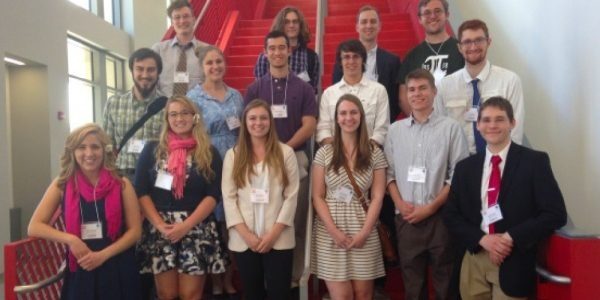Gonzaga students of all disciplines gain valuable experience by presenting their research at state, regional, and national conferences, where participating students showcase their research to peers and professors, network with experts in their fields, bond with fellow Gonzaga students, and gain valuable communication skills.
Students Make a Mark at Mathematical Association of America Section Meeting
One exciting conference opportunity comes annually from the Mathematics Department. Every year, a group of students travels to the Pacific Northwest Mathematical Association of America Section Meeting to listen to theoretical and practical talks by big-name speakers and faculty from surrounding universities. Students then present their own research to peers, judges, and other participants. Last year, Gonzaga students won two of the conference’s three prizes for undergraduate research. Mathematics major Samantha Fall presented her research regarding a flaw in the code for the computational math program Mathematica. Because of Fall’s findings, Mathematica’s developer is working to fix the bug. Furthermore, a group from the 2015 conference published their ideas in a mathematical journal.
Faculty of the Mathematics Department assist students with their research, taking the time to mentor their advisees through the process of formulating and executing ideas.
Professor Thomas McKenzie, a longtime participant in the regional event, says, “Math is interdisciplinary. We have a lot of students come to us from outside the Mathematics Department—Computer Science, Physics, and so on. We try to help them as best we can, and we get students from a wide array of disciplines at this conference.”
Fifteen Gonzaga students attended this year’s conference. “It was a huge growing experience,” Fall says. “Giving a presentation in front of a lot of people, you gain confidence in your own ideas.”
Undergraduate Women in Physics
This year, physics major Emma Peatfield and physics and engineering double-major McKenzie Horner presented at the Conferences for Undergraduate Women in Physics. Their journey to the event began in the summer of 2015 with Assistant Professor of physics Erik Aver. Together, using observations of galaxies taken by the Sloan Digital Sky Survey, the three worked on a research project regarding the so-called “primordial helium abundance.” Their collaborative research provides rare insight into the conditions of the universe just three minutes after the Big Bang, which allows them to evaluate current understandings of the behavior and make-up of the early universe. Peatfield and Horner attended CUWiP at Oregon State University in Corvallis from Jan. 15-17, where they presented a poster on their research, which received high marks from evaluating members.
The Impact
Biology Professor Nancy Staub, an advisor to many students, explains the benefits of presenting at research conferences. “They offer the opportunity to interact with a wide variety of peers doing research, as well as give students exposure to well-known and recognized scientists.”
The awards and honors received by undergraduates at these conferences are a testament to students’ hard work and dedication to their craft, and also to the support of Gonzaga faculty.
Supporting Our Students
In line with the College’s mission to foster scholarly inquiry and collaboration, conference attendance—including travel, lodging, and fees—is funded by the College of Arts and Sciences through University and donor support.
To give online to the College of Arts & Sciences, visit www.gonzagawill.com/giveonline,
select ‘I’d like to choose my Gonzaga Will Campaign Priority,’
and under Academic Innovation, select ‘College of Arts and Sciences Excellence Fund.’
The CAS Excellence Fund supports student research, academic innovation,
global engagement, and community outreach.
